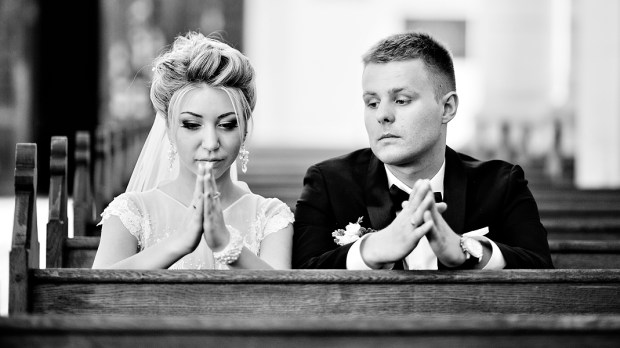In excerpts from an interview originally published in Polish, Father Zbigniew Kaplanski, rector of the Family of Families Pastoral Center in Warsaw, discussed whether a marriage between a Catholic and a person of no faith, or of a different faith, can work. His answer: it’s a challenging path, but it’s not impossible. Mutual respect and an authentic life witness are key elements for such a marriage to succeed.
Respect and authenticity
Father Kaplanski: In my opinion, the particular person is the key. If John, a doubting and seeking atheist, loves Rachel, a Catholic, then whatever is important to her is important to him. So a church wedding and a vow made before an altar will have significance for him as well.
In the Church, we try to make sure that an atheist does not pretend to be a believer, that he is honest. And he does promise to stay with her “till death do us part.” It depends on whether John respects himself and his words. If so, the outward expression of commitment, the covenant, as we say, will be binding. But if this man does not respect his word, meaning that he does not respect himself, then he will not respect the solemn oath he took, even one made in such a special place. To him, neither this nor any other promise will be binding.
If John respects Rachel, then he respects her beliefs and the meaning of her spiritual experience. The first (completely nonreligious) rule says that if they want to live in harmony, they should adhere to the principles of the person following the more difficult rules. I read this wisdom some thirty years ago, possibly in a Buddhist text, possibly during studies about family. Over the years of pastoral ministry, I realized that if both spouses act this way, they usually fare well.

Read more:
Struggling in your marriage? Think of Mother Teresa and don’t give up
If you love someone, then you respect their values and rules, and you help them follow them. So if your fiancé is a vegetarian, you don’t cook a roast every Sunday and don’t roll your eyes when he reaches for salad and eggs. And he doesn’t make faces when you say, “Today is Sunday, I’m going to church.”
I know of families where when a Catholic mom is ill, the atheist father takes the kids and drives them to church, and then waits until the end of the Mass to bring them home. If you love someone, you help them fulfill their principles.
So if you hear from your fiancé when you are visiting friends, “Honey, you have Mass at 6 p.m., we should get going,” and you know that he would like to stay and talk with them, then this is a man who respects you and pays attention to what is important to you.
Faith is transmitted through life witness, not words
I know people who have a hidden dream that their partner will convert. It does happen, but I have to admit that I have never seen theology convert anyone. It is always a person who by his or her life shows what faith is. The one who believes in God hears one day, “Your life is so wonderful, I’d like to have the same.” So an atheist could want to learn about faith because of their loved one for whom the faith is a great value.
Read more:
What to do when your spouse won’t go to Mass with you and the kids
Sometimes I also see a nonbeliever come close to faith without converting, and he starts to understand more. By living with a believer, he learns that, for example, that moral principles have a deeper meaning and rational justification for existence.
Transcendence is in each of us, especially when we have lived many years and are inclined to reflection. There is a longing for transcendence somewhere deep in everyone. In the words of St. Augustine, “My heart is restless until it rests in the Lord.”
This article was originally published in the Polish Edition of Aleteia.

